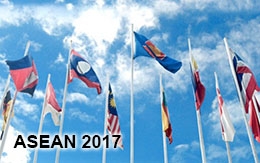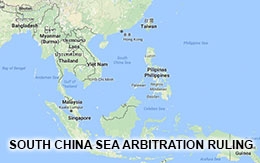The Potential Utility of International Law in Conflict Mitigation and Resolution in the South China Sea
The conflicts in the South China Sea have a substantial legal dimension. The disputes over territorial sovereignty and maritime rights are classical subjects of international law. UNCLOS provides a comprehensive framework of international rules on the maritime claims of the riparian States and the use of the South China Sea by nations generally. The compulsory dispute settlement system under the UNCLOS envisages an effective and rule-based process for mitigating and resolving maritime conflicts.

The conflicts in the South China Sea have a substantial legal dimension. The disputes over territorial sovereignty and maritime rights are classical subjects of international law. UNCLOS provides a comprehensive framework of international rules on the maritime claims of the riparian States and the use of the South China Sea by nations generally. The compulsory dispute settlement system under the UNCLOS envisages an effective and rule-based process for mitigating and resolving maritime conflicts.
The PCA arbitration between the Philippines and China has pushed to the forefront the question of whether and how international law, including the international dispute settlement process, may usefully contribute to the mitigation and resolution of conflicts in the South China Sea. It is an important question that is now overshadowed by China’s outright rejection of the arbitration award, the Philippines’ incoherent behaviour under the Duterte administration, the varied reaction of the international community and the uncertainty in the responsive strategies of other riparian States.
The PCA Arbitration
The PCA arbitral tribunal formed under Annex VII of the UNCLOS and composing five eminent law of the sea experts delivered the merits award in July 2016 that was supported by many governments in and outside the region. It also won accolades from much of the international legal community. China has carried out a global public relations campaign in an attempt to discredit the tribunal and the award and vowed “no recognition, no acceptance and no compliance”. Whilst the substance of the tribunal’s jurisdiction and merits awards involve important and complex questions that are open to further inquiry and debates, in the context of conflict mitigation and resolution, several points may be addressed:
a) Non-appearance
China’s decision to boycott the entire arbitral proceedings marked the first time in 27 years (since the US withdrawal from the Nicaragua case) that a State resorted to wholesale non-appearance in an international case. This turns out to be an ill-advised and critical move with the tribunal delivering an award that demolishes the legal bases of China’s maritime claims in the South China Sea. Whilst China’s non-appearance is entirely self-inflicted and does not detract in any way from the legitimacy of the tribunal and the awards, the Philippines arguably obtained a decided advantage in the case all things considered and the process and the outcome of the case took on a lopsided character. This renders China’s non-compliance not only expectable but even somewhat pardonable. In consequence, a major miscalculation by China not only deprived from the outset any practical prospect of the case for settling the disputes between the parties, but also skewed and shifted a proper assessment of the role of the international legal process in conflict resolution.
By all accounts, China views the Philippines’ institution of the arbitral proceedings as a legal ambush of which it had no advance knowledge and preparation. The mere 30-day window afforded to China under UNCLOS in which to nominate an arbitrator adds to the pressure that led ultimately to the ill-fated decision of non-appearance. The Philippines’ strategy of bringing the legal case without prior notification or consultation with China may have maximised its legal position in the case, but it also added insult to injury, landing China in a humiliating situation where it committed an elementary yet strategic error from which it could not recover. In this sense, the failure of the case in terms of bringing about the conflict resolution was almost pre-ordained from the conception of the case by the Philippines.
b) Jurisdiction
The Chinese government and scholars levied ferocious criticism on the tribunal’s finding on jurisdiction and some of the arguments have found support from international lawyers outside China. One of the most pointed criticisms on the jurisdictional issue came from outside China which questioned the tribunal’s power to characterise certain maritime features as low-tide elevations, thus effectively negating China’s sovereignty claims over them. Whilst the tribunal’s authority to determine its own jurisdiction is unimpeachable and China’s out-of-court retort was more ineffectual than it was unpersuasive, debates over the jurisdiction of the dispute settlement body in light of the optional exclusions declared by multiple maritime powers inhibit the role of international law in conflict resolution.
c) Merits
In contrast to its strong response to the tribunal’s jurisdictional findings, the Chinese government has been strikingly muted so far in its engagement with the merits award. Although this can be explained on a number of grounds, the government in Taiwan launched spirited defence for its claim (which China shared) to the Itu Aba Island. Whilst the award will have strong precedential effect on the claims of other riparian States against China, its authority in international law and international conflict resolution may depend on its reception by international courts and tribunals in future cases as well as by academic commentaries.
d) Non-compliance
If history is guide, almost all States that lost an international case, whether or not there was non-appearance, would eventually comply with the judgment or award in some way. China seems to have avoided asserting the ambiguous dotted line since the announcement of the merits award, and has demonstrated an unheralded interest in engaging in negotiation with the Philippines, apparently in an attempt to limit the damage of the case. The reaction from the international community and other claimant States would go a long way in bringing about compliance in the long term.
China’s Attitude to the Rule-based World Order
Whether international law can play an effective role in mitigating and resolving conflicts in the South China Sea depends very much on China’s attitude to the rule-based world order manifested in the current international legal system. There are several factors that strongly push China towards positive engagement with international legal order:
a) The Reform and Openness Policy
Since Deng Xiaoping’s launch of market-oriented economic reform in China in the late 1970s, the reform and openness policy has become part of the Communist Party’s orthodoxy. Although liberal and conservative forces in the Party fought incessantly with each other to try to reformulate and reinterpret Deng’s legacy, the core idea of opening up to the outside world and integrating China in the existing international order has won general support in the Party and become part of the national consensus.
b) China’s Rise
The massive economic growth and social change that China enjoyed in the past four decades resulted significantly from the working of the current international order. China has often been considered as the greatest beneficiary of current international system and Pax Americana. Until the net benefit China could derive from the existing international order is irreversibly lost, China would be driven by self-interest to continue to accept and work within the status quo.
c) Domestic Constituency
Chinese economy and society have grown dramatically and are now inextricably connected with the international community. International business, education and culture have long infiltrated the Chinese society especially since the dawn of the internet age. From the top elite to the growing middle class, Chinese nationals enjoy increasing international mobility that conduces to a globalised outlook. This has provided an important antidote to the expansion of nationalistic sentiment.
d) Invisible College of International Lawyers
Although the community of international lawyers in China remains at the nascent stage of development, decades of education, research and dissemination of international law as well as contact with international law schools and legal institutions abroad have cultivated a generation of international law specialists and an awareness of international legality. If repeated vows of commitments to international rule of law by top state leaders are more of diplomatic rhetoric than operative policies, the work of international lawyers in the government, the academia and the profession, including increasing participation in international and foreign legal proceedings by the Chinese government and the ongoing discussions of recognising the effect of international law in the national constitution, serve to place China on a progressive trajectory.
However, some major factors also exist that militate against China’s engagement with the international legal order.
a) Inadequate expertise
The PCA tribunal attributed China’s expansionist behaviour in the South China Sea to its “misunderstanding” of its rights and obligations under the international law of the sea. Whilst this is clearly not the entire cause, and China now boasts some accomplished international lawyers with considerable technical expertise qualified international lawyers remain few and far between. The fact that China took 8 years before exercising the optional exclusion under UNCLOS and that few in China seem to have been aware of the possibility of a State binging China into a case before an Annex VII tribunal are also proof.
b) Cynicism with International Law
The widespread cynicism with international law, especially with international judicial institutions, amongst international lawyers in the Chinese government and academia was most vividly on display in their relentless and often scurrilous attacks on the PCA arbitral tribunal and its award. This partly stems from the lack of rule of law and judicial independence in China’s domestic order and consciousness. Instrumentalist notion of law is the orthodoxy, even more so in international law than in domestic law. The United States and Japan seem to be blamed for any misfortune that may befall China. It is regrettable that the South China Sea case seems to have bucked a trend in China which had seen in recent years more active involvement in international judicial process and increased faith in international courts. China’s participation in the advisory proceedings in ICJ and ITLOS cases and its regular participation in the WTO dispute settlement process had been the highlights of that development.
c) Censorship
The tightening grip of the media and academia in China and the intensified crackdown on dissent under the Xi Jinping administration have also had a chilling effect on the international law community in China. Issues of sovereignty and territorial disputes have always been sensitive topics on which international lawyers are expected to toe the party line. The South China Sea arbitration is but the latest example of the forced unanimity of Chinese international lawyers. Whilst the lack of diversity of opinion inevitably hurts China’s decision making capacity, the problem is unlikely to be ameliorated in the short term.
d) Nationalism
With its persistent rejection of liberal democracy and the deteriorating economic and ecological conditions in China, the Communist Party has found nationalism one of the few remaining tools at is disposal to justify its political legitimacy. The corrosive effect of state-sponsored nationalism can be seen at work in other factors that have driven China away from international rule of law. The Chinese government promotes nationalistic sentiment as a focal point of its educational and propaganda programs, whilst at the same time using domestic pressure generated by nationalism as a principal justification for its policy in national and international discourse. One need not exaggerate the impact of the propagandised "century of humiliation" narrative. Whilst there is no doubt the Communist Party has persisted in using the century of humiliation to buttress its claim to legitimacy, developments in the past decades have been too transformative to allow any major impact of the narrative. It is difficult to hold on to the narrative as a frame of reference for foreign policies after China's rise to the second largest economy in the world, the Beijing Olympics, the Nobel prize winnings, etc.
It should be stressed, though, that whilst nationalism remains the most obstinate and dangerous force against China adhering to a rule-based liberal world order, nationalism is a fundamentally destabilising movement. Legitimacy gains from fanning up patriotism could be easily offset by resentment against the government for not upholding national interest aggressively enough. The government's strategy to manage domestic nationalism remains a key factor that drives China's attitude to the international legal order.
Conclusion: History and Law
The gulf between China's traditional notion of world order and the contemporary international legal system is all too evident in the wake of the PCA's award in the South China Sea arbitration. The dismantling of China's historical rights narrative is most striking and forces China to refashion the legitimacy of its South China Sea policy. Whilst it is difficult to reconcile China's blatant repudiation of its treaty obligation to comply with the arbitral award with its continued rhetoric for upholding international law, it is notable that China has continued to appeal to legal and historical discourse in its efforts to salvage the South China Sea claims.
International observers have long identified the significant disconnect between the highly controversial nature of China's claims to historical facts on the South China Sea and the strictly sanitised version that the Chinese government has been feeding to its own citizenry from elementary school books to government white papers. The debunking of the historicity of the Chinese claims in the merits award in the South China Sea arbitration has remarkably met with near silence from China.
Meanwhile, the Chinese government and its think tanks appear to be digging deep into the legal concept of archipelagic waters in an attempt to develop a pseudo-legal theory of the South China Sea islands as a unitary base for maritime claims. Whilst the effort is almost as hopeless as the historical rights, the community of international lawyers should be engaged for a rational and evidence-based dialogue on positive rules of international law.
For international law to achieve as fully as possible its potential in mitigating and resolving conflicts in the South China Sea, history remains a key factor in the legal and policy discourse. The unmasking of the facts and myths of the history and historiography of the South China Sea would go a long way towards reconciling the Chinese aspirations, pride, bias and disingenuity with contemporary norms of international governance.
Bing Ling is Professor of Chinese Law and and Associate Dean (International), Sydney Law School, University of Sydney.
The paper was presented at the Conference: "The South China Sea in the Broader Maritime Security of the Indo-Pacific Conference", 28-30 September 2016, Canberra, Australia. This conference is co-organized by UNSW Canberra at the Australian Defence Force Academy (ADFA), the Diplomatic Academy of Vietnam (DAV), and the Japan Institute of International Affairs (JIIA).










